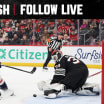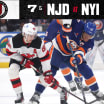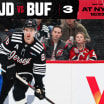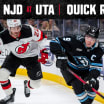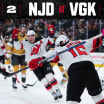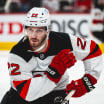The past 13 months have been notable for its lack of convention, but this week marks the return of an international staple and for scouting NHL prospects.
The IIHF World Under-18 Championship is taking place at two venues in suburban Dallas, pitting a large swath of this year's draft eligible players against one another culminating in the medal games on May 6.
The tournament is open to 2003-born (or younger) players and is a 10-country event that, like most things in the sporting world at the time, was cancelled last spring. The tournament was moved to Dallas from Michigan because of problems brought on by the pandemic.
The usual suspects - Canada, Russia, Sweden, the U.S. and Finland - will contend for the medals, though Canada's 12-1 rout of the Swedes to open the tournament likely makes them the favorite heading into medal round play.
FEATURE: World Under-18 Championship to Showcase Tomorrow's Stars
The World U-18 Championship is underway in Texas with some elite talent participating
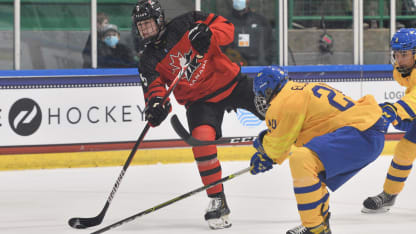
In addition to the scouting opportunities, the U-18 has come to be defined by American dominance over the past 15 years.
"The Americans always have a great team and they should every year, it's (that program's) Stanley Cup," said Darren Rumble, who is now a coach in the Quebec Major Junior Hockey League with the Gatineau Olympiques, but was the head coach of Team Canada the last time the U.S. won gold in 2017.
Rumble is referring to USA Hockey's hugely successful national team development program that hothouses the country's top 17- and 18-year-old players at its headquarters in Michigan. The Americans have won the event on 10 occasions, nine between 2005 and '17.
Finland won in 2016 and again in '18. Sweden, playing on home ice with Devils prospect Alexander Holtz in a leading role, took gold in 2019, the last tournament before last year's cancellation. Canada's last gold medal came eight years ago in Sochi, Russia when Connor McDavid made his international hockey debut.
Canada, its apparent top line consisting of 17-year-old whiz kid Shane Wright, Dylan Guenther and Brennan Othmann, also looked good in a 5-1 exhibition win over Finland on the weekend. The strength of the Canadian team will come up front, where Mason McTavish, Chase Stillman and Francesco Pinelli also are expected to have big roles. Canada's top defenseman is Brandt Clarke, who is the younger brother of Devils prospect, Graeme.
Guenther is considered the top-rated NHL Draft prospect playing in the tournament. Wright is the early favorite to go No. 1 overall in 2022.
Speaking of 2022, another name to keep an eye on for that draft, but also this week - we aren't making this up - is Jack Hughes. Seriously, the American forward is expected to be one of the hosts' top forwards and as a late-born 2003, won't be eligible to be selected by an NHL club until next year.
Though the U.S. has sent more talented teams in the past, it will have home ice advantage and the continuity to which Rumble referred to. Forward Chaz Lucius, who could be a top-10 pick in July, was expected to be the Americans' top draft-eligible player, but has been ruled out.
Other potential high first-rounders in action are defensemen Clarke and Simon Edvinsson, along with fellow Swede Fabian Lysell, a forward.
The QMJHL is conducting a truncated postseason right now and kept its players at home, including a handful of potential first-rounders, while the Western Hockey League allowed its prospects to travel to Texas.
Beyond Lucius, injury has ruled out a few others, most notably American defenseman Luke Hughes, Jack's younger brother, and Canadian forward Cole Sillinger. All three players are expected to be taken in the top-half of the first round in July.
Though he's not a slam dunk, the consensus top player for this year's Draft is Canadian defenseman Owen Power, who plays for the University of Michigan. A late-born 2002, Power has outgrown the competition, as have two of his Wolverine teammates, forwards Matthew Beniers and Kent Johnson, both of whom are expected to be taken not long after Power.
The class's top two goaltenders, Jesper Wallstedt and Sebastian Cossa, are also late-born 2002s and are not playing this week.
Most draft-eligible players were forced to play a scattered schedule, or go on loan agreements with European clubs, where they played in mostly lower- or mid-tier leagues against pros. Scouting therefore was largely an apples-to-oranges exercise, often on video until restrictions started to be relaxed. So, even as many players are absent this week, the apple-to-apples environment of playing with and against other draft-eligible is a rich live-viewing opportunity for both scouts and those they're evaluating.
Beyond this year, the presence of Wright and fellow Canadian forward Connor Bedard is a bonus. As odd as it seems to project about a 16- and 17-year-old in a season where they've both barely played, Wright (2022) and Bedard (2023) are the early favorites to go No. 1 in the next two drafts.
Two years ago, Wright was granted exceptional status to play in the Ontario Hockey League as a 15-year-old, and scored 39 goals for the Kingston Frontenacs, while winning the Canadian Hockey League's rookie of the year award. Bedard became the WHL's first exceptional-status player last year and had 28 points (12G-16A) in just 15 games this season playing for the Regina Pats at the same age.
Wright and Bedard's presence at the tournament at such a young age has the early feel of what McDavid did in 2013.
For now, that's where the comparisons end.
"I won't call them generational, or even franchise (NHL) players," said one scout of Wright and Bedard, "it's too early for that kind of talk, and you can only have one player a generation any way."
Another scout, who had not yet seen Bedard, called Wright a "franchise-altering" prospect.
The next week will determine which players will alter their own draft status and who are the medal-winners on May 6.

